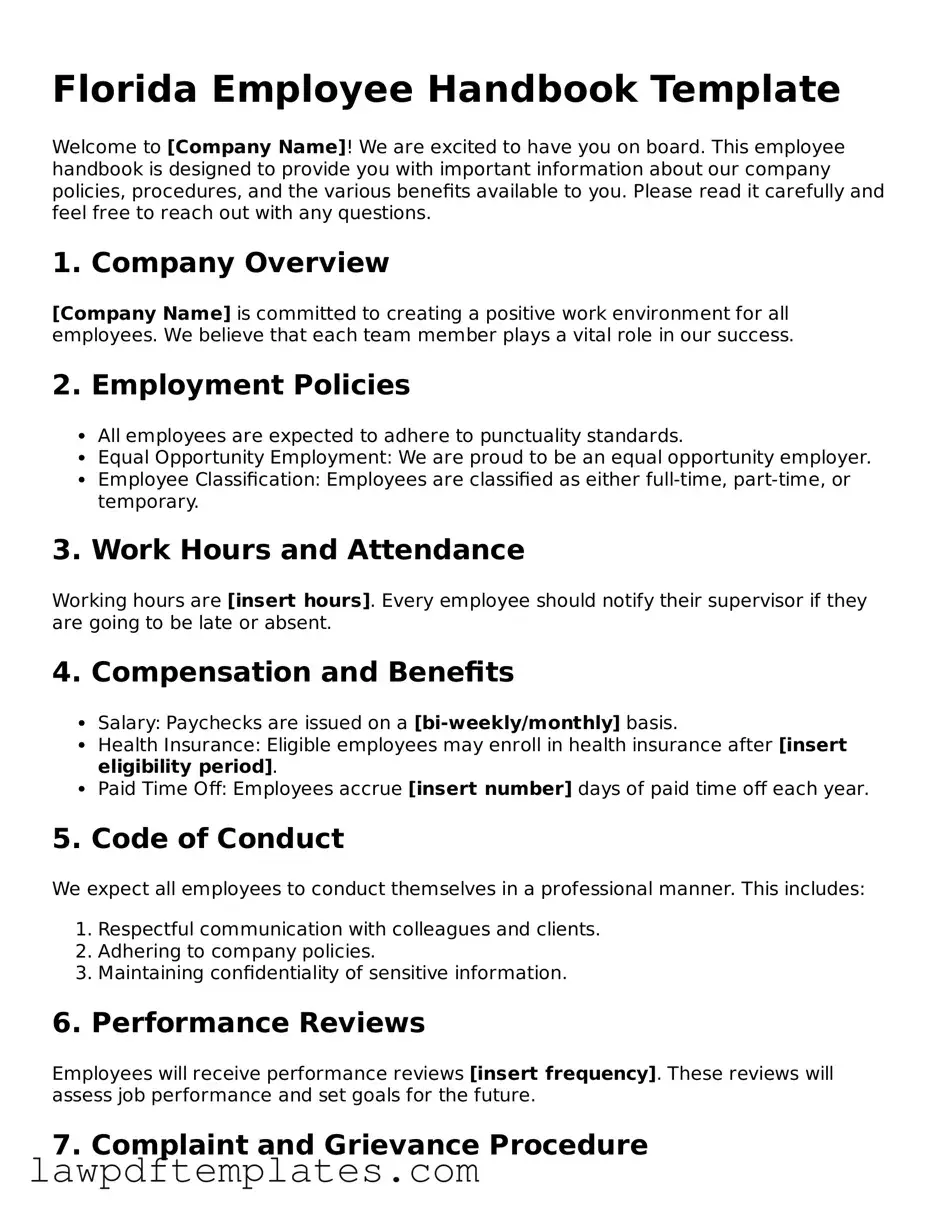Free Employee Handbook Template for the State of Florida
Form Breakdown
| Fact Name | Details |
|---|---|
| Purpose | The Florida Employee Handbook serves as a guide for employees regarding company policies and procedures. |
| Legal Requirement | While not legally required, having an employee handbook is highly recommended for compliance with state and federal laws. |
| Governing Laws | Key laws include the Florida Civil Rights Act and the Fair Labor Standards Act. |
| Content Areas | Common sections include workplace conduct, benefits, and leave policies. |
| Employee Acknowledgment | Employees are often required to sign an acknowledgment form confirming receipt and understanding of the handbook. |
| Updates | Handbooks should be reviewed and updated regularly to reflect changes in laws and company policies. |
| Legal Protection | A well-crafted handbook can provide legal protection for employers by clearly outlining expectations and procedures. |
Sample - Florida Employee Handbook Form
Florida Employee Handbook Template
Welcome to [Company Name]! We are excited to have you on board. This employee handbook is designed to provide you with important information about our company policies, procedures, and the various benefits available to you. Please read it carefully and feel free to reach out with any questions.
1. Company Overview
[Company Name] is committed to creating a positive work environment for all employees. We believe that each team member plays a vital role in our success.
2. Employment Policies
- All employees are expected to adhere to punctuality standards.
- Equal Opportunity Employment: We are proud to be an equal opportunity employer.
- Employee Classification: Employees are classified as either full-time, part-time, or temporary.
3. Work Hours and Attendance
Working hours are [insert hours]. Every employee should notify their supervisor if they are going to be late or absent.
4. Compensation and Benefits
- Salary: Paychecks are issued on a [bi-weekly/monthly] basis.
- Health Insurance: Eligible employees may enroll in health insurance after [insert eligibility period].
- Paid Time Off: Employees accrue [insert number] days of paid time off each year.
5. Code of Conduct
We expect all employees to conduct themselves in a professional manner. This includes:
- Respectful communication with colleagues and clients.
- Adhering to company policies.
- Maintaining confidentiality of sensitive information.
6. Performance Reviews
Employees will receive performance reviews [insert frequency]. These reviews will assess job performance and set goals for the future.
7. Complaint and Grievance Procedure
If you experience any issues at work, please follow these steps:
- Discuss the issue with your immediate supervisor.
- If unresolved, submit a written complaint to [HR/Management].
- Seek further assistance from [insert higher authority] if necessary.
8. Termination Policies
Termination can occur through resignation, retirement, or company decision. It is important to provide proper notice of your intent to leave.[insert notice period]
9. Acknowledgment of Receipt
By signing below, you acknowledge that you have received, read, and understood the [Company Name] Employee Handbook.
Employee Name: [insert name]
Date: [insert date]
Common mistakes
Filling out the Florida Employee Handbook form is an important step for both employers and employees. However, many individuals make common mistakes that can lead to misunderstandings or complications later on. Awareness of these pitfalls can help ensure that the form is completed correctly and efficiently.
One frequent mistake is not reading the entire handbook before filling out the form. The handbook contains essential information about company policies, employee rights, and responsibilities. Skimming through it may lead to missing critical details that could affect an employee's understanding of their role or the company's expectations.
Another common error involves providing incomplete or inaccurate personal information. Employees should ensure that their names, addresses, and contact details are correct. Inaccuracies can lead to difficulties in communication and may hinder the processing of important documents.
Failing to sign and date the form is also a significant oversight. A signature indicates that the employee has read and understood the handbook, while the date confirms when the acknowledgment was made. Without these elements, the form may be considered invalid, causing complications for both parties.
Some individuals neglect to ask questions about sections they do not understand. The handbook is designed to clarify policies, but it can be complex. Employees should feel empowered to seek clarification on any point that seems unclear. Ignoring this can lead to confusion and potential disputes in the future.
Additionally, employees sometimes overlook the importance of keeping a copy of the signed form for their records. This document serves as proof that they have acknowledged the handbook and its contents. Without a copy, employees may find themselves in challenging situations if questions arise later.
Lastly, many individuals fail to update their information when changes occur. Life events such as a change of address, marital status, or job title should be communicated to the employer promptly. Keeping information current ensures that employees receive important communications and benefits without interruption.
Discover More Employee Handbook Templates for Specific States
Creating an Employee Handbook - Information on employee recognition programs can be found within the handbook.
Oshr - This form provides information on performance review processes.
Employee Handbook Template - Access information about employee health and wellness initiatives.
For those seeking a straightforward way to fulfill this requirement, the Texas Employment Verification form can be conveniently accessed online at https://texasformspdf.com/fillable-texas-employment-verification-online, ensuring that employers can efficiently provide the necessary employment details needed for the verification process.
Employee Handbook California Template - Understand the company’s stance on confidentiality and data protection for both employees and clients.
